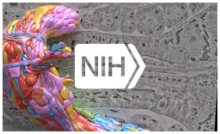
Separate events on Tuesday, September 30 highlighted the awardees of the first round of NIH BRAIN Initiative grants and the additional investments by companies, foundations, patient advocacy organizations, universities, and private research institutions to support the BRAIN Initiative.
At the National Press Club, NIH Director Francis Collins, alongside NINDS and NIMH Directors and representatives from the scientific and advocacy community, congratulated the first 58 NIH BRAIN Initiative grant awardees. Approximately $46 million in federal grants will support the research projects of over 100 investigators in 15 states and three countries. Emphasizing the importance of developing next-generation tools for studying the brain in health and illness, Collins featured several grants when describing the initiative’s overall potential impact. Collins referred to BRAIN as America’s next moonshot on his blog, declaring that the 12-year scientific plan for BRAIN should enable “the next leap in understanding the brain.”
White House Office of Science and Technology Policy Director John Holdren and Deputy Director for Technology and Innovation Tom Kalil later unveiled the broad response to the President’s call for “an all hands on deck” effort to support the BRAIN Initiative at a White House press conference. Major foundations, patient advocacy organizations, universities, and corporations, including the Simons Foundation, GE and Google, will align more than $240 million in research efforts with the BRAIN Initiative. Kalil called for “the emergence of regional technology clusters,” which will form via contributions from several private companies involved in neuro-based technologies.
Additionally, the U.S. Food and Drug Administration (FDA) and the Intelligence Advanced Research Projects Activity (IARPA) have joined the BRAIN Initiative. The FDA, while not directly supplying funds for research, plans to heighten the transparency of the regulatory landscape for medical devices to treat brain disorders. IARPA will be funding a handful of innovative research projects involving machine learning.
More information about the exciting growth of the BRAIN Initiative can be found here.
